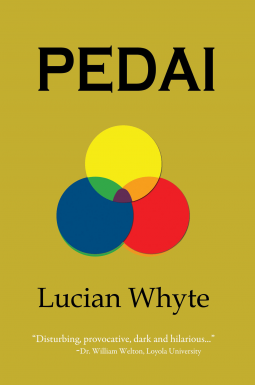
PEDAI
by Lucian Whyte
This title was previously available on NetGalley and is now archived.
Send NetGalley books directly to your Kindle or Kindle app
1
To read on a Kindle or Kindle app, please add kindle@netgalley.com as an approved email address to receive files in your Amazon account. Click here for step-by-step instructions.
2
Also find your Kindle email address within your Amazon account, and enter it here.
Pub Date Jan 01 2011 | Archive Date Feb 27 2013
Description
Advance Praise
“Disturbing, provocative, dark and hilarious…” Dr. William Welton, Loyola University
“Pedai will lead you glorying in paradox.” Dr. Penny Livermore, Northwestern University
This novel concerns friendship and includes characters from my first two novels: Antinomy and Reign of Eros. Pedai combines elements of Greek Tragedy and the Modern Novel. Containing elements of Magical Realism and composed of grammar and syntax influenced by ancient Greek and Latin, Pedai centers on the Other, my main character. Here he develops bonds both negative and positive, and the symbolism of the work centers around the moral-aesthetic implications of friendship. The Other revisits some of the major experiences in his life and in a defective, human manner, his moral center emerges; thus Pedai is a turning point for the Other. Brazil is his artistic and troubled comrade who grows jealous of Mallory, a depressed opportunist with ulterior motives. The Other is searching specifically for a bond with the One who is the second main character of the series and the embodiment of unity (thus the magical realism). Leon is a gregarious computer technician with motives of his own. He is a kind of foolish hero of the novel, contrasted to the anti-heroic nature of the Other. Kate is Leon’s friend and bond as is the Brigade who is Leon’s boss. Adder Dareios is a self-interested entrepreneur whom Leon and the Brigade unsuccessfully court in order to begin a business venture. The narrative symbolism is based upon the primary hues, which means that each of the characters with which the Other bonds has a certain color associated with them. During a discussion between Brazil, the Other’s most significant bond, and the One, here manifesting as an old man, the symbolism of the colors is made evident. The Other never meets the One in Pedai, but he does form, develop and ruin bonds along the way. The novel ends in aporetic fashion, with uncertainty its finish. Pedai is the third in a ten-book series.
Lucian Whyte teaches ancient Greek and Latin literature at DePaul University. His most significant literary influences include Hesse, Kafka and Sophocles. His scholarly interests include tragic and comic motifs in Plato’s dialogues, and Greek tragedy.
Available Editions
| EDITION | Ebook |
| ISBN | 9781935605959 |
| PRICE | $7.99 (USD) |



